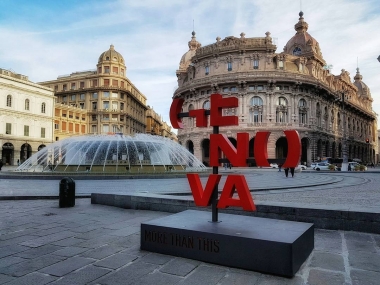Genoa and its work on a sustainable tourism development
Edited on
04 February 2021Genoa has been recognized for long time as an industrial city, dominated by its port and its historical steel industries which were the main economical sources of the city until its drastic imagine change occurred with the renovation of the ancient port, designed by the famous Genoese architect Renzo Piano in 1992.

Starting from that moment the history of tourism in Genoa has changed and developed until reaching two big objectives: one was its role as European Cultural Capital in 2004 and two years later culminated in the recognition of the Rolli Palaces (a complex of ancient buildings located in the city) as UNESCO World Heritage.
All these milestones have been supported by a commitment provided by the local administration, which designed strong communication and brand campaigns, as well as specific cultural events, to raise the potential tourist awareness of the city in the European and World scenario.
In recent years all these efforts led to an increase of tourism in terms of thousands of persons per year. But these results were possible only thanks to the involvement and collaboration among the public administration, its local stakeholders and civil society.

The participation to two previous URBACT projects, one as partner, City Logo and one as lead partner, Interactive Cities, helped the Municipality to strengthen its competences in participatory approaches, as well as increase its tourism appeal. This new project, Tourism-Friendly Cities, is the result of a work methodology already tested and a consequence of a real need in managing the growing tourist flows to preserve its genuine identity.
In this URBACT Local Group have been involved several stakeholders of the tourism industry: from the cruise companies, to the airport, hotel owners, tourist guides, accommodation booking platforms, cooperatives. Also, public representatives have a strong role in this path, as the University and the cross-sectoral cooperation among different departments of the Municipality, witnessed firsthand by the commitment of the Deputy Mayor for Tourism and City Promotion, Laura Gaggero.
After a good start of work, during all over the 2020 our identified priorities had to change due to COVID-19 situation and this brought us to imagine and project different types of tourism scenarios.
Indeed, tourism is one of the sectors most affected by the COVID-19 pandemic, impacting economies, livelihoods, public services and opportunities, so now rebuilding tourism is also an opportunity for transformation with a focus on leveraging its impact on destination and building more resilient communities and businesses through innovation, digitalization, sustainability, and partnerships.
One of the first decision taken, was to adapt the usual event on Rolli Palaces, with the free opening to the public, tourists and citizens, twice a year, of the UNECO World Heritage, into a complete digital version.
The Rolli Days Digital Week, which took place virtually from 19th to 23th of May, was a total success in terms of visibility and access to an even large public than before: 1 millions people all over the world had the chance to visit and discover the amazing beauty of the historical Genoese palaces, with the opportunity to travel virtually, totally safe and to dream the possibility to visit Genoa in person, once this situation will come to the end.
The second edition of the Rolli Days, from 10th to 11th October, was both digital and real, in order to manage the flows of visitors and guarantee social distancing.
The Rolli Days Digital Week was only one of the initiatives developed during this period.
The Tourism department, in strong cooperation with other relevant stakeholders of the Municipality, created the Genoa City Pass 72 hours, the official tourist pass of Genoa that allows tourists to discover the city while making the most of their free time. The card can be created and customized according to the tourists’ needs: depending on the type of visit, it can be declined in different ways:
- Cultural and Heritage, with access to museums and culture experiences
- Be active, with sea and parks experiences
- Edutainment, with access to the aquarium and other main attractions of the city

In this way tourists are free to plan in advance their visit and to have a broader view of the possibilities of the city. On the other hand, the Municipality can be advantaged from this card, with longer stays of visitors, the chance to manage tourist flows and to diversify the tourism offer.
The Tourist Department has also designed some specific pedestrian tours in the historical centre: tourists can decide their perfect tour thanks to digital maps and cultural contents that they can direct download on their mobile phone, also using a qr code.
In order to enhance Genoa even more as a tourist destination, the Municipality and the Chamber of Commerce have implemented an online platform, a real "store" in which tourism products and services can be published and promoted for free: a showcase through which potential visitors from all over the world can consult and plan their trip and stay in Genoa, in an easy and immediate way. Tourist operators could send their proposal with an online open call and promote their offers.
This crisis is also an unprecedented opportunity to transform the relationship of tourism with cities, climate, nature and the economy. It is time to rethink how the sector impacts resources and ecosystems, working on a more sustainable idea of travel and a collective and coordinated response by all stakeholders, Municipalities, tourists and citizens can stimulate the transformation of tourism.
Sabrina Bruzzone - Municipality of Genoa
Submitted by Sabrina Bruzzone on
